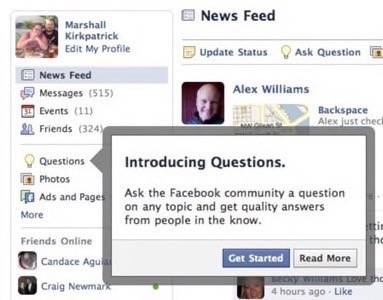Take one look at the newly launched Facebook Questions feature and it’s clear that things are about to change dramatically on the world’s largest social network. Take a second look and it’s also clear that the feature isn’t working very well yet – but it will be fixed and is going to be a very big deal.

A few million people have been given access this afternoon to Facebook Questions, a social Question & Answer feature built under the leadership of Blake Ross, co-creator of the Firefox browser years ago and now an employee at Facebook. Questions may come closer than anything else has yet to founder Mark Zuckerberg’s vision of Facebook as a connector of people around the world, a force for empathy and world peace. I think it’s going to be a very important and enjoyable part of the site.

It might be tempting to assume that Facebook Questions is going to end up a cesspool of idiocy, harshness and partisan tyranny of the majority. But look at it this way: The most successful social software company in the history of the world hired the creator of the Firefox browser who worked for months to build an effective Q&A service and you think it’s going to turn into a YouTube dumb-fest? That’s not the outcome I’d bet my money on.
The most successful social software company in the history of the world hired the creator of the Firefox browser who worked for months to build an effective Q&A service and you think it’s going to turn into a YouTube dumb-fest? That’s not the outcome I’d bet my money on.
Scale, social software smarts and real identities have the potential to add up to something really magical. Company founder Mark Zuckerberg, wrong as he is about many things like
, has said that his goal with Facebook is to build empathy and connection between different people all around the world. If he was in it for the money, he would have taken Yahoo’s $1 billion offer years ago and run. That goal of cultural change may very well be served better by Questions than by any other Facebook feature to date.
Facebook as Empathy Engine
Why do people listen to Rush Limbaugh on the radio? Because they are idiots, right? Wrong, according to Grant Fisher, a grad student at St. Mary’s University School of Law in Texas. Fisher offered a lengthy, intelligent, insightful and sympathetic answer to that question on Facebook today and his answer has been voted to the top of the question’s page. Fisher says people listen to Limbaugh because he has decades of experience researching politics, because he articulates to conservatives what (he believes) liberals are thinking and to liberals what (some) conservatives are thinking and because many people believe he has a good track record of predicting what’s going to happen in politics. And because he’s entertaining.
That’s a good, informative answer and one that has already changed my shallow thinking about Rush Limbaugh fans. I’m a little embarrassed to admit that I would pass judgement on a huge group of people so thoughtlessly and callously, but I know I’m not alone. And neither is Fisher alone in offering a high-quality answer to a controversial question on Facebook.

There are going to be some very interesting questions and answers about peace in the Middle East, the Pro Life vs Pro Choice debate, drug policy, race, gender, the environment – you name it.
Because Facebook Questions are open to the whole world and because answers are voted on, we’re going to learn a whole lot about other peoples’ perspectives. Most of the Facebook newsfeed is filled with Farmville updates, baby pictures and misspelled drunken rambling. That will never bring me closer to the personal thoughts of a woman in Indonesia, a young boy in Egypt or a Canadian Mounty who rides through the snow-covered hills on a horse all day, thinking about why on earth people listen to Rush Limbaugh on the radio. But the public, voted-on Questions feature will.
Early users of the service are offering long, thoughtful answers. That will change in time, but answers that aren’t helpful will not be voted up. Will obnoxious partisan answers be voted to the top in a tyranny of the majority? Even if such an answer were to be at the top, the next one below it would likely be more informative, empathetic and useful. Facebook engineer Beau Hartshorne has also said on the site that users will be demoted if they ask questions that are really assertions. There will be individual Questions that get nothing but terrible answers – but in aggregate, due to the scale of the humanity doing the voting, I think the Questions experience will be on balance strong.
I think we’re going to see some really good discussions on Facebook. These conversations aren’t going to be like YouTube. They aren’t going to be like Wikipedia. They aren’t going to be like Yahoo Answers, with millions of questions asked again and again, with no legacy knowledge retained and developed over time. They are going to be like Stack Overflow, and those are some really good conversations.
People will have their hearts and minds changed about controversial matters after using a well-designed social Q&A feature on a sprawling world-wide social network like Facebook. This will be a net win for the human experience. I don’t think that’s an exaggeration at all.
I think millions of people will end up spending hours browsing through Facebook Questions, learning things. I think it’s going to be great. As soon as they fix it and make it work better.
















